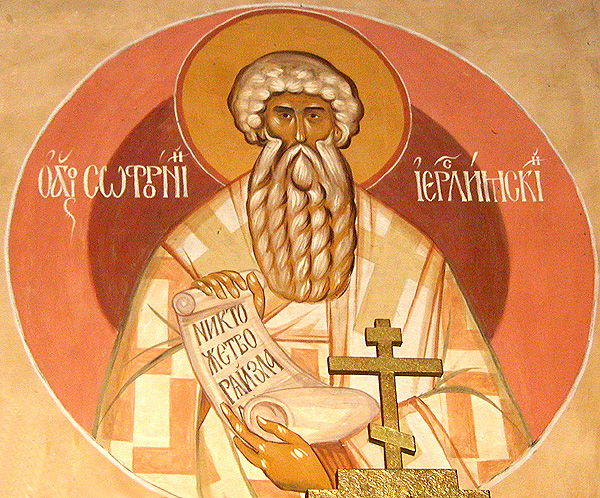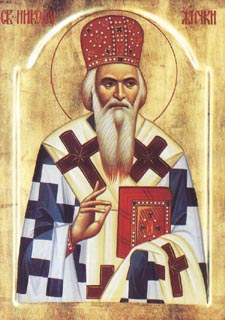Theology
St. Sophronius the Patriarch of Jerusalem
25. March 2018 - 11:57 Saint Sophronius, Patriarch of Jerusalem, was born in Damascus around 560. From his youth he was distinguished for his piety and his love for classical studies. He was especially proficient in philosophy, and so he was known as Sophronius the Wise. The future hierarch, however, sought the true philosophy of monasticism, and conversations with the desert-dwellers.
Saint Sophronius, Patriarch of Jerusalem, was born in Damascus around 560. From his youth he was distinguished for his piety and his love for classical studies. He was especially proficient in philosophy, and so he was known as Sophronius the Wise. The future hierarch, however, sought the true philosophy of monasticism, and conversations with the desert-dwellers.
He arrived in Jerusalem at the monastery of Saint Theodosius, and there he became close with the hieromonk John Moschus, becoming his spiritual son and submitting himself to him in obedience. They visited several monasteries, writing down the lives and spiritual wisdom of the ascetics they met. From these notes emerged their renowned book, the LEIMONARION or SPIRITUAL MEADOW, which was highly esteemed at the Seventh Ecumenical Council.
The Orthodox Aestetics in the Hagiography of St Arsenius of Srem
19. March 2018 - 11:50Fresco painting depicting the burial service of St Arsenius
in The Patriarchate of Pec
An opening discussion for further research
At this historical moment of our struggle to keep Kosovo and Metohija within the boundaries of Serbia, and in the light of 1220th anniversary of 1st Ecumenical Council, it seems sensible to discuss the topic of burial services as presented on frescoes and icons in the Patriarchate of Pec. A new iconoclasm has been present in Kosovo and Metohija in the course of recent years. We have recently visited Pec, i.e. on the occasion of celebrating the Feast of Holy Protection of Тheotocos and once again experienced silent prayers of this sanctuary area, the See of Serbian Archbishops and Patriarchs; it is a sanctuary in wich holy relics of saints and icons speak a wordless language. The peace of the Sanctuary takes us into another dimension; it is witnessing of the one crying in the contemporary wilderness spreading the voice of the Truth.
The Heavenly-earthly Citizenship of the City of God
19. March 2018 - 11:48by Bishop Jovan (Puric)
Ladies and gentlemen,
We have been invited to make a presentation before this eminent gathering, in the briefest possible manner, a sort of introduction to the Christian understanding of the city and citizenship in Byzantium, within the framework of the topic we have chosen – “The Heavenly-Earthly Citizenship of the City of God.”
As is well known, the topic of city and citizenship is quite current in the civilization and the time we live in. I think that Christian witnessing can make a valuable contribution to this topic, in underlining the originally Christian and primarily theological aspects of this topic, which often remain outside the bounds of consideration in philosophical, anthropological, sociological and, in general, culturological approaches, or are, even, totally ignored.
Saint John Chrysostom: Liturgical Ethos and Modernity
18. March 2018 - 20:49Bishop Dr. Jovan (Puric)
Modernity confronts us with many dilemmas. Man must answer challenges, and not only those for which his teachers in his educational-upbringing process prepared him, but also totally new and different problems that life places before us. And it has always been so. Still, sociologists, pedagogues and culturologists generally agree that today’s world is changing at a significantly faster pace than before. The technological progress and social innovations of the 20th century have transformed the world much faster than, for instance, the entire process of technological development during medieval times. This tempo of development has continued to this day.
Saint Bishop Nikolai Of Ohrid and Zhicha and Enlightener of America
18. March 2018 - 20:43Like St. Sava , the Enlightener of Serbia, holy Bishop Nicholai died in a foreign land. Behind the main church of Chelije Monastery in his home village of Lelich, next to the grave of Archimandrite Justin Popovich ( +1979) , was marked a place for his return to the homeland and the people he so very much loved. Thus, on April 27, 1991, after twenty five years of repose in the Lord in America, holy Bishop Nicholai’s bodywas returned to his homeland in western Serbia. Pious American Orthodox, particularly many Russian Orthodox, did not forget theblessed Nicholai, as at St. Tikhon’s Monastery his room wasmade into a shrine for prayer and meditation.
Repose of St Nikolai of Zhicha
18. March 2018 - 15:01 Commemorated on March 18
Commemorated on March 18
Saint Nikolai of Zhicha, “the Serbian Chrysostom,” was born in Lelich in western Serbia on January 4, 1881 (December 23, 1880 O.S.). His parents were Dragomir and Katherine Velimirovich, who lived on a farm where they raised a large family. His pious mother was a major influence on his spiritual development, teaching him by word and especially by example. As a small child, Nikolai often walked three miles to the Chelije Monastery with his mother to attend services there.
Sickly as a child, Nikolai was not physically strong as an adult. He failed his physical requirements when he applied to the military academy, but his excellent academic qualifications allowed him to enter the Saint Sava Seminary in Belgrade, even before he finished preparatory school.

